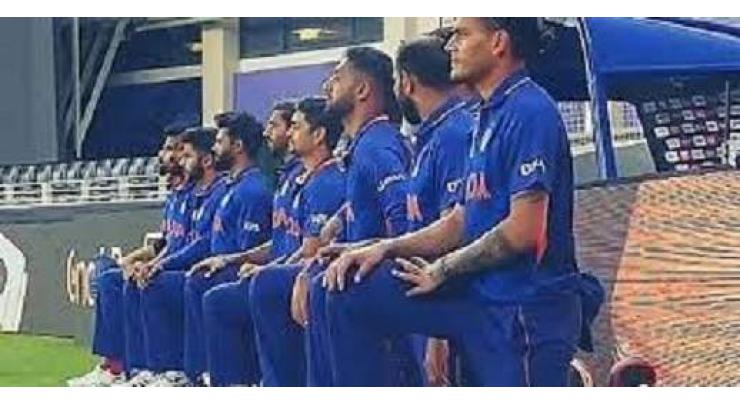
Dragging Politics Into Sports: Another Stigma On India's Secular Face
Zeeshan Mehtab Published September 29, 2025 | 10:10 PM

The refusal by the Indian cricket team to accept the Asia Cup trophy from Syed Mohsin Naqvi, Chairman of Pakistan Cricket Board (PCB) has sparked widespread criticism from civil society, diplomats, former athletes, and peace advocates across Pakistan
PESHAWAR, (APP - UrduPoint / Pakistan Point News - 29th Sep, 2025) The refusal by the Indian cricket team to accept the Asia Cup trophy from Syed Mohsin Naqvi, Chairman of Pakistan Cricket Board (PCB) has sparked widespread criticism from civil society, diplomats, former athletes, and peace advocates across Pakistan.
This negative attitude of indian players appearantly directed by the fascist Modi Govt showed total disregard for the spirit of sports besides a total disregard for cricket known as gentlemen game.
The unpleasant incident, which unfolded under the glare of international cameras on Saturday at UAE, has become a poignant reminder of how politics continues to spill over into sports arenas meant to foster unity, and shared joy.
The Asia Cup, a celebrated tournament in the cricketing world, has long been a symbol of subcontinental rivalry played by mutual respect. But the events that followed the final match between arch rivals after conclusion of Asia Cup took an uncomfortable turn.
When Syed Mohsin Naqvi stepped forward to hand over the trophy, Indian cricketers were seen hesitant and distant, with no one stepping up to receive the coveted prize directly from Asian Cricket Council President.
This subtle but deliberate act was enough to stir conversations across South Asian sports. For many, it was more than a diplomatic negativity but in reality it was a clear breach of sportsmanlike conduct.
Former Pakistani allrounder Umar Gul voiced what many in the cricketing community were thinking. "The players of Pakistan Cricket team showed great sportsmanship throughout the tournament, regardless of the pressure or political tensions besides match outcome
In contrast, he said the Indian team’s behavior during the trophy ceremony was disappointing and sets a poor precedent for the sport.
Umar Gul added that sports should remain above political hostilities. "When players bring national politics onto the cricket field, it not only devalues the spirit of the game but also sends a message that divisions are more important than unity even in moments of shared achievement."
"Across history, sports have been celebrated for its power to heal and unite divided communities. The Olympics, FIFA World Cup, Cricket World Cup and even regional tournaments like the Asia Cricket Cup have offered moments where differences were set aside, if only briefly, in favor of common celebration."
"Not accepting Asia Cup trophy from PCB Chairman was not just a stigma on India secular face but a missed opportunity to show maturity and grace after May conflict between the two countries," said Rakhshanda Naz , a Peshawar-based human rights activist and member of a cross-border peace initiative.
"Whether we like it or not, every gesture from our athletes on such a stage sends a message to millions watching on TV and mobile screens. And this negative message by Indian players was neither positive nor inclusive but it tarnished the India image globally especially in sports world."
Social media platforms have been abuzz with reactions from Pakistani citizens as many expressing disappointment over the visible politicization of the sports in India.
“Sports is one of the last few neutral grounds we have left. When we allow politics to creep in sports, we rob ourselves of something pure,” said Umar Gul.
Others pointed out that this incident could further strain already tense Indo-Pak relations, especially at a time when diplomatic dialogue is at a standstill.
Professor Dr Ejaz Khan, former Chairman International Relations Department at University of peshawar said that India, often celebrated for its secular ethos and cultural pluralism, finds itself facing uncomfortable questions after not accepting Asia Cup trophy from PCB Chairman.
He said the refusal to accept the trophy from a Pakistani official has been interpreted as a reflection of the rising politicization and communal rhetoric that has gradually crept into India’s public institutions including sports.
“What happened on Saturday night may be symbolic for Indians but symbols matter,” said Ejaz Khan.
“India, a country known for its diversity, should be leading the way in showing how sports can rise above politics instead, we saw a moment of smallness where there could have been greatness.”
As the dust settles on the Asia Cup, calls for introspection are growing louder. While rivalries on the pitch add spice to the game, bringing animosity off the pitch dilutes the true spirit of sportsmanship.
Former cricketers have echoed a common sentiment that cricket should be used to build bridges and not burn them.
As cricketing boards prepare for upcoming international fixtures and the ICC World Cup looms on the horizon, the hope remains that such episodes do not become the new normal. Because in a region as complex and politically charged, sports can and must serve as a reminder of our shared humanity.
Recent Stories
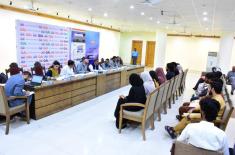
UoG scholarships ,support 3800 students
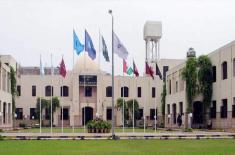
UHS launches structured house job for DPT graduates

Open Masters Games Abu Dhabi 2026 spotlights sports as catalyst for health, incl ..
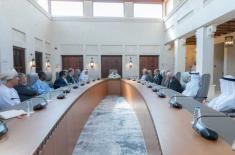
Sharjah Ruler chairs Arab Theatre Institute council meeting

Al Dhafra Dates Festival & Auction to launch on 17 October in Madinat Zayed

'Mohammed bin Rashid Government Fellowships' initiative launched in collaboratio ..

World Governments Summit, Association of Caribbean States sign Partnership Agree ..
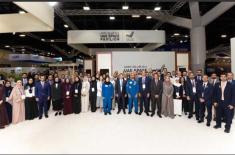
UAE takes part in International Astronautical Congress 2025

Abu Dhabi economic delegation visits US to boost investment

Fujairah to host 13th Energy Markets Forum tomorrow

Abu Dhabi Judicial delegation reviews Serbia’s correctional, rehabilitation ce ..

Suicide blast in Quetta kills 5, attack foiled by security forces
More Stories From Sports
-
DG Sports assures to address issues faced by athletes
1 hour ago -
Pakistan squad named for South Africa Test series
2 hours ago -
Pakistan wheelchair cricket squad thrashes Afghanistan in T20 opening match
4 hours ago -

PCB suspends NOCs for players for foreign leagues after facing defeat in Asia Cup 2025
4 hours ago -

ICC Women’s World Cup 2025 begins in India and Sri Lanka
5 hours ago -

Pakistan announces 18-member squad for Test match series against South Africa
5 hours ago
-

3-day women’s boxing talent hunt camp kicks off in Hyderabad
20 hours ago -

Dragging politics into sports: Another stigma on India's secular face
19 hours ago -

Inter-university mega sports tournament to be launched on Oct 01: Meena Majeed
20 hours ago -

Inter-university mega sports tournament from Oct 01: Meena Majeed
21 hours ago -
Fatima Sana confident as Pakistan begin ICC Women’s CWC campaign
22 hours ago -

Comprehensive School thrash Beaconhouse by 128 runs
21 hours ago







